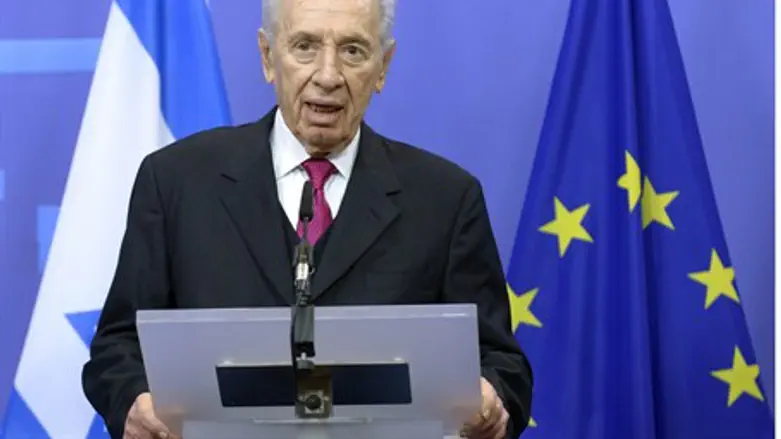
President Shimon Peres met on Thursday with NATO Secretary General Anders Fogh Rasmussen at NATO headquarters in Brussels.
The two discussed the importance of strengthening the strategic cooperation between Israel and NATO in the security and technology fields.
According to a statement from Peres’s office, the President briefed the NATO Secretary General on the strategic threats is facing in the Middle East with a focus on the threat of a nuclear Iran and Hizbullah.
At the beginning of the meeting Peres stressed Israel's concern regarding the situation on Israel's northern border and said, "We are monitoring the ongoing attempts to build up weapons by Hizbullah which is stockpiling weapons and missiles for terrorism and war.
He added, “Hizbullah is sowing destruction in Lebanon and must be seen as a terrorist organization in every way.”
The two agreed during their discussions that Israel and NATO are partners in the fight against terror and the search for peace and they discussed ways to maintain security in the Middle East and the world, the statement said.
President Peres stressed the need to maintain and increase the cooperation between Israel and NATO and Israel's ability to cooperation and provide technological assistance and knowledge from the vast experience Israel had gained in the field of counter-terrorism.
“Israel will be happy to share the knowledge it has gained and its technological abilities with NATO. Israel has experience in contending with complex situations, and we must strengthen the cooperation so we can fight global terror together and assist NATO with the complex threats it faces including in Afghanistan," Peres told Rasmussen.
Following the meeting the two delivered joint statements to the press and Secretary-General Rasmussen said that “Israel is an important partner of the Alliance in the Mediterranean Dialogue. The security of NATO is linked to the security and stability of the Mediterranean and of the Middle East region. And our Alliance attaches great value to our political dialogue and our practical cooperation. Israel is one of our longest-standing partner countries. We are faced with the same strategic challenges in the Eastern Mediterranean. And as we face the security threats of the 21st century, we have every reason to deepen our long-standing partnership with our Mediterranean Dialogue countries, including Israel. We all know the regional situation is complex. But the Mediterranean Dialogue remains a unique multilateral forum, where Israel and six Arab countries can discuss together with European and North American countries common security challenges. I see further opportunities for deepening our already close political dialogue and practical cooperation to our mutual benefit.”
President Peres thanked Rasmussen, saying, "Israel is not a member of NATO but is a partner of NATO. We share the same values of peace and security and we also share the same threats. Terrorism today affects the entire world. I congratulate you for all that you are doing as Secretary-General of NATO."
Peres, who is on an eight-day tour to Brussels, Paris and Strasbourg, has focused his efforts on urging the European Union to formally label Hizbullah as a terrorist organization.
Earlier on Thursday, President Peres met with the President of the European Commission, Jose Manuel Barroso.
Peres said that Hizbullah, which so far has remained off its official list of terrorist groups, would only be encouraged to expand its operations unless it were labeled as such.
The president said Hizbullah is now intervening directly in Syria against rebels opposed to President Bashar al-Assad, and thus is spreading its reach.
“If you do not take measures against Hizbullah, then they may think they are permitted” to do as they please, Peres said after the meeting with Barroso.
Pressure on the EU to add Hizbullah to the list of recognized terror groups has increased since Bulgaria named the terror group as being behind the terrorist attack in Burgas last July, in which five Israelis were killed.
However, diplomats have indicated that it is unlikely that Europe will name Hizbullah a terrorist organization because of its political strength in Lebanon.
Shortly after the Burgas bombing, the EU decided not to list Hizbullah as a terrorist group.
Cypriot Foreign Minister Gujarat Cossack-Marcolis said at the time that "there is no consensus on the issue, because Hizbullah also has an active political arm."
The statement from Peres’s office said he also discussed the threat of Iran with Barroso.
“Iran is not just a threat to Israel but to the entire world,” Peres said. “The coalition being led by the United States of America and Europe to prevent Iran is using economic sanctions which are preferable to the military option. The sanctions have achieved more than was expected but have yet to achieve their aims – and so we must continue and ensure Iran does not become nuclear armed.
“Iran is threatening the world not only because of its pursuit of nuclear weapons but also with its blatant disregard for human rights and the killing of innocent people. Protecting human rights is not just for our children but also for the wellbeing of Iranians,” he added.
Barroso told Peres, "The European Union is conducting a huge international effort on the Iranian issue – even at an economic cost which is being paid by some of our member states due to the economic sanctions."

